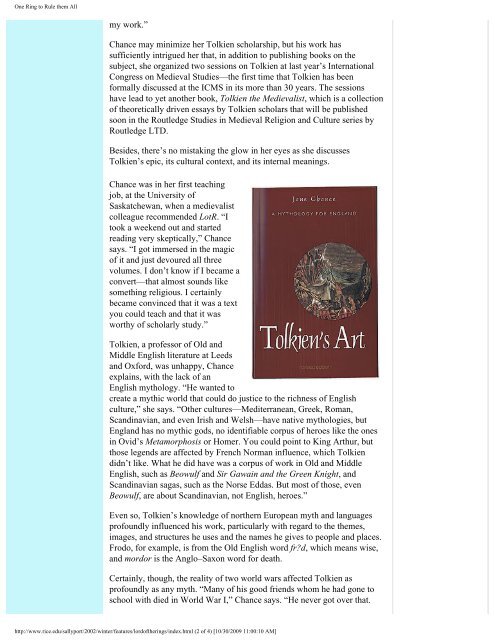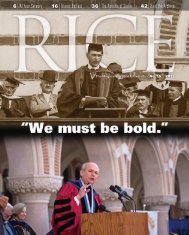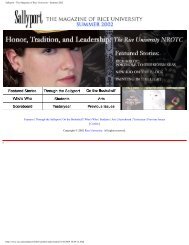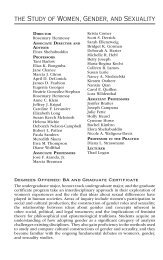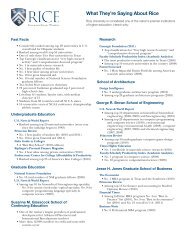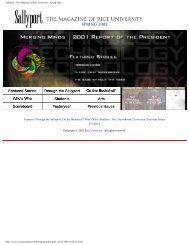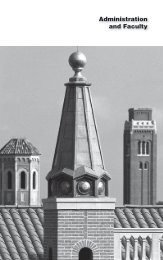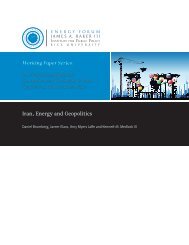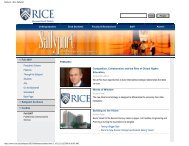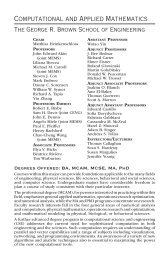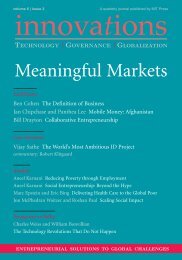Sallyport - The Magazine of Rice University - Winter 2002
Sallyport - The Magazine of Rice University - Winter 2002
Sallyport - The Magazine of Rice University - Winter 2002
Create successful ePaper yourself
Turn your PDF publications into a flip-book with our unique Google optimized e-Paper software.
One Ring to Rule them All<br />
my work.”<br />
Chance may minimize her Tolkien scholarship, but his work has<br />
sufficiently intrigued her that, in addition to publishing books on the<br />
subject, she organized two sessions on Tolkien at last year’s International<br />
Congress on Medieval Studies—the first time that Tolkien has been<br />
formally discussed at the ICMS in its more than 30 years. <strong>The</strong> sessions<br />
have lead to yet another book, Tolkien the Medievalist, which is a collection<br />
<strong>of</strong> theoretically driven essays by Tolkien scholars that will be published<br />
soon in the Routledge Studies in Medieval Religion and Culture series by<br />
Routledge LTD.<br />
Besides, there’s no mistaking the glow in her eyes as she discusses<br />
Tolkien’s epic, its cultural context, and its internal meanings.<br />
Chance was in her first teaching<br />
job, at the <strong>University</strong> <strong>of</strong><br />
Saskatchewan, when a medievalist<br />
colleague recommended LotR. “I<br />
took a weekend out and started<br />
reading very skeptically,” Chance<br />
says. “I got immersed in the magic<br />
<strong>of</strong> it and just devoured all three<br />
volumes. I don’t know if I became a<br />
convert—that almost sounds like<br />
something religious. I certainly<br />
became convinced that it was a text<br />
you could teach and that it was<br />
worthy <strong>of</strong> scholarly study.”<br />
Tolkien, a pr<strong>of</strong>essor <strong>of</strong> Old and<br />
Middle English literature at Leeds<br />
and Oxford, was unhappy, Chance<br />
explains, with the lack <strong>of</strong> an<br />
English mythology. “He wanted to<br />
create a mythic world that could do justice to the richness <strong>of</strong> English<br />
culture,” she says. “Other cultures—Mediterranean, Greek, Roman,<br />
Scandinavian, and even Irish and Welsh—have native mythologies, but<br />
England has no mythic gods, no identifiable corpus <strong>of</strong> heroes like the ones<br />
in Ovid’s Metamorphosis or Homer. You could point to King Arthur, but<br />
those legends are affected by French Norman influence, which Tolkien<br />
didn’t like. What he did have was a corpus <strong>of</strong> work in Old and Middle<br />
English, such as Beowulf and Sir Gawain and the Green Knight, and<br />
Scandinavian sagas, such as the Norse Eddas. But most <strong>of</strong> those, even<br />
Beowulf, are about Scandinavian, not English, heroes.”<br />
Even so, Tolkien’s knowledge <strong>of</strong> northern European myth and languages<br />
pr<strong>of</strong>oundly influenced his work, particularly with regard to the themes,<br />
images, and structures he uses and the names he gives to people and places.<br />
Frodo, for example, is from the Old English word fr?d, which means wise,<br />
and mordor is the Anglo–Saxon word for death.<br />
Certainly, though, the reality <strong>of</strong> two world wars affected Tolkien as<br />
pr<strong>of</strong>oundly as any myth. “Many <strong>of</strong> his good friends whom he had gone to<br />
school with died in World War I,” Chance says. “He never got over that.<br />
http://www.rice.edu/sallyport/<strong>2002</strong>/winter/features/lord<strong>of</strong>therings/index.html (2 <strong>of</strong> 4) [10/30/2009 11:00:10 AM]


